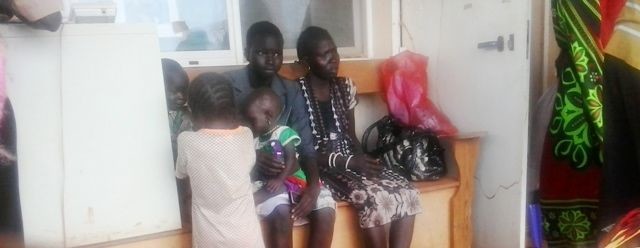United Nation Mission in South Sudan (UNMISS) has denied reports that its officers have blocked refuge-seeking civilians entry to the UN site in Wau, Western Bahr al Ghazal, where there are already more than 700 people under protection.
Last month a group of Nuer soldiers and trainees were attacked in Mapel military barracks in the same state, causing them to flee to the bush for their safety. The incident sparked off more unrest in barracks in Wau, after which families of runaway soldiers as well as Nuer students at the university sought protection from UNMISS.
Some of the people living in the camp at the UNMISS ‘Protection of Civilians (PoC) site’ in Wau have complained that some of their relatives were barred from entering the PoC site.
UNMISS State Coordinator in Western Bahr al Ghazal State, Winnie Bahihuga, was accused of having instructed the UN police not to allow newcomers on the basis that the current situation in the town is peaceful and that the current displaced residents at the PoC might be inviting their extended families to join them only in order to get humanitarian help, not because they are actually in danger.
Speaking to Radio Tamazuj on Thursday, the state coordinator said she is not aware of any such report, saying the UN mandate is protect any civilians from imminent danger: “I think that is absolute lies – nobody has been rejected. The UN mandate is protection of the civilians from any imminent danger.”
But civilian sources cited the case of a group of women who were turned away on Monday by UNMISS for failing to identify themselves as ‘persons under threat.’ The women were instead told to go to Girindi Military barracks for ‘verifications.’
In a telephone interview, a community leader inside the PoC site in Wau, Jeremiah Gift, said it is true the incident has happened, claiming the UN did stop a group of women with their children from entering the camp.
“Their husbands have defected to the rebels and now they came to seek protection,” Jeremiah said of the women who were allegedly turned away.
The leader also expressed frustration at the poor living conditions inside the camp, saying five people are sleeping in one tent, which he said is not enough to accommodate them. “Our situation is bad – no drugs, and no good food for our children, who are suffering with illness every day.”
Sarah Gordon Kok, a woman who identified herself as one of the victims of the incident in Mapel, where her husband ran to the bush, also complained of the situation in the camp.
“Since we came from Mapel a lot has happened to us. UN brought us up to their compound and we slept outside the UN gate for three days with our children,” she told Radio Tamazuj.
“We have a small hospital here, but this hospital only provides medical treatment for adult people and our children sometimes can’t take some medicine with them.”
Sarah also believed the same rumours about the UN turning away refuge-seekers, saying she thought maybe it was the government that gave orders to UN not to allow people seeking protection.




